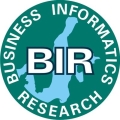10th Workshop on Information Logistics and in the Age of Digitization (ILOG 2018)
in conjunction with 17th International Conference on Business Informatics Research, BIR 2018
ILOG 2018 is the 10th workshop in a series which focuses on approaches, methods, technologies and solution for reducing information overflow and for improving information flow in organizations. Knowledge-intensive industry and service sectors, public organizations and governmental bodies are dependent on accurate and timely information supply for efficient and high quality processes and services. Intelligent information supply has become an important issue that is characterized by just-in-time, demand-oriented and context-sensitive information. A specific focus of this year’s ILOG edition will be on digitization. Digitization is a topic frequently discussed in the public both from a technological and societal perspective. The term digitization as such describes the massive use of latest development in ICT, such as Internet-of-Things, mobile communication, sensors, machine learning, self-organizing systems and big data for a fusion of real-world objects and processes, and their virtual representation. This is supposed to lead to new products and services, new business models and more efficient operations in enterprises and organizations.
The digitization of businesses poses new requirements to optimized information supply and emphasizes the importance of information logistics solutions. In this context, we invite papers addressing these requirements and potential solution and we also encourage submission addressing the use semantic technologies, like ontologies, semantic nets, semantic web standards and other knowledge technologies. Such technologies and related methods have proven to be an important of information logistics and knowledge supply solutions. Many information logistics applications wouldn’t be feasible without moving from data processing to also interpreting the meaning of this data.
The ILOG workshop aims to bring together people who have strong interest in semantic technologies, information systems, information logistics, enterprise solutions and knowledge-based systems. We invite researchers and practitioners from both industry and academia to submit original results of their completed or ongoing projects. We encourage broad understanding of possible approaches and solutions for information logistics and applications of semantic technologies.
Information Logistics and Digitization
- Challenges in information logistics originating from digitization, IoT, BD and CPS
- Showcases in digitization motivating information logistics or presenting solutions
- Practices of information logistics
- Experience reports about and showcases of information logistical applications
- Information logistics and knowledge supply in small and medium sized enterprises
- Organizational implementations of information logistics and knowledge supply approaches
- Internet-of-Things and information logistics
- Big data applications in information logistics
- Cyber-physical systems and information logistics
- Enterprise Architecture Management in the context of information logistics
- Literature surveys and systematic literature analyses
- Concepts and architectures for intelligent information supply solutions
- Modeling of information processes and user demands
- Description languages for information demand and information services
- Business processes in information and knowledge management
- Economic effects and relevance (business cases)
- Business models for just-in-time information supply
- Metadata in information and knowledge management
- Active information systems
- Models for location and context
- Time based information delivery
- Concepts for self awareness of information distribution
- Location transparency
- Information handling in process contexts
- Infrastructures and approaches for knowledge supply
- eMaintenance and Information Logistics
Semantic Technologies
- Challenges of semantic technology use in information logistics and information systems
- Literature surveys and systematic literature analyses
- Business ontologies, domain ontologies and application ontologies
- Application of ontologies in Enterprise Modeling
- Ontology Design Patterns
- Economic effects and relevance (business cases)
- Ontology engineering, ontology based systems engineering
- Experience reports about and show cases of ontology use
- Best Practices of ontology use Value modeling using ontologies
- Ontology based competence modelling for human resource management systems
Submissions to ILOG 2018 have to be made by using the submission systems EasyChair. All accepted workshop papers will be published in CEUR proceedings. A selection of best papers will be invited to submit paper extensions for a special issue of the journal on Complex Systems Informatics and Modeling Quarterly (CSIMQ). Papers submitted need to follow LNBIP formatting guidelines available from Springer.
Papers shall not have more than twelve pages (including figures, tables and appendices). Longer papers will not be included in workshop proceedings.
- Paper submission: August 2, 2018
- Notification of acceptance: August 30, 2018
- Camera ready submission: September 5, 2018
- Workshop: September 24, 2018
Program committee chairs
• Kurt Sandkuhl, University of Rostock (Germany) (co-chair)
• Ulf Seigerroth, Jönköping University (Sweden) (co-chair)
• Birger Lantow, University of Rostock (Germany) (co-chair)
Program committee (preliminary)
• Clara Bassano, “Parthenope” University of Naples (Italy)
• Andreas Billig, Fraunhofer ISST Berlin (Germany)
• Eva Blomqvist, CNR-ISTC (Italy)
• Susanne Busse, FH Brandenburg (Germany)
• Francesco Calza, “Parthenope” University of Naples (Italy)
• Olov Candell, Saab Group (Sweden)
• Albertas Caplinskas Institute of Mathematics and Informatics (Lithuania)
• Wolfgang Deiters, Fraunhofer ISST (Germany)
• Barbara Dinter, University of Chemnitz (Germany)
• Henrik Eriksson, Univ. Linköping (Sweden)
• Michael Fellmann, University of Rostock (Germany)
• Janis Grabis, Riga Technical University (Latvia)
• Darek Haftor, Linnæus University (Sweden)
• Yanbo Han, Inst. Computing Techn., Chin. Acad. of Science (China)
• Ramin Karim, Luleå University of Technology (Sweden)
• Marite Kirikova, Riga TU (Latvia)
• Ralf D. Kutsche, TU Berlin (Germany)
• Birger Lantow, Rostock University (Germany)
• Michael Leyer, University of Rostock (Germany)
• Tatiana Levashova, St. Petersburg Institute Inform. & Autom. (Russia)
• Paolo Piciocchi, University of Salerno (Italy)
• Rainer Schmidt, München University (Germany)
• Ulf Seigerroth, Jönköping International Business School (Sweden)
• Alexander Smirnov, St. Petersburg Institute Inform. & Autom. (Russia)
• Janis Stirna, Stockholm University (Sweden)
• Vladimir Tarasov, Jönköping University (Sweden)
• Alfred Zimmermann, Reutlingen University (Germany)

